25 Jun 2014 | News, Russia, Ukraine
Wrestling for the rights to define the Ukrainian conflict, both Russia and Ukraine have utilised a range of tactics to control and limit media coverage in the region. This, alongside, the constant to and fro between media freedom and the skewed official lines has politicised the role of the media and manipulated perceptions of the conflict, further distancing coverage from reality.
Every fact is a battle to be fought and won. Who made up the Ukrainian protest movement? Activists and other members of civil society, or thugs, neo-Nazis or far-right extremists? What are Russia’s motivations? Geo-political revisionism, a nationalistic desire to rebuild empire or for the protection of a persecuted minority? There is not one answer to questions like these; indeed the answers appear to changes depending on where they come from.
A sure-fire tactic to control the number of answers on offer is to limit the number of journalists able to cover the story. There have been a number of cases across the region where journalists have either been detained or refused entry to key areas of the conflict. In May, it was reported that three journalists, including a writer for Russia Today, had been detained by Ukraine’s Security Services (SBU), with a further three refused entry at the border. With no clarification of the grounds for their detention, as well as refusing them access to legal representation, the legality of such acts is dubious at best; as Human Rights Watch (HRW) states: “Failure to provide information on the whereabouts and fate of anyone deprived of their liberty by agents of the state, or those acting with its acquiescence, may constitute an enforced disappearance.”
This however, is not a tactic employed exclusively by Ukraine. According to the Committee to Protect Journalists (CPJ), Russian authorities and pro-Russian separatists detained five journalists in Crimea and mainland Ukraine. On 2 June in Donetsk, unidentified armed men in camouflage raided the offices of regional newspapers Donbass and Vecherny Donetsk, detaining senior editorial staff, and accusing the publications of “incorrect reporting”. It is reported that the captor’s demands included the stipulations that the editors, “change the papers’ editorial policy”.
This proved to be effective. The deputy editor of Donbass stated that both his paper and Vecherny Donetsk were “discussing the separatists’ demands and were considering shutting down the outlets for fear of future retaliation”.
Beyond limiting the freedom of journalists covering the conflict, state-led censorship and propaganda is creating media vacuums in key areas, promoting narrow and strictly controlled interpretations of the conflict.
Attacks on the media in Russia have ramped up significantly following Putin’s return to the presidency and have taken on a distinct urgency with the continuation of the Ukraine conflict. One example is the legislation pushed through the Duma banning the publication of negative information about the Russian government and military. This positions Russian activities in Ukraine at the heart of controlling perceptions of Russia in the media. Quoting the official explanatory note to the legislation, HRW reports: “’The event in Ukraine in late 2013-early 2014 evidenced…an information war’, and demonstrated the necessity to protect the younger generation from ‘forming a negative opinion of [their] Fatherland.’”
Another key piece of legislation at play in this context is the “Lugovoi Law”, which allows Roskomnadzor, the Russia state body for media oversight, to block online sources without any court approval. One publication that was blocked was Grani.Ru due in part to its criticism of the state’s handling of the Bolotnaya Square protests. Grani.Ru have unsuccessfully appealed the ruling, but Yulia Berezovskaya, director-general of Grani-Ru is not surprised.
Roskomnadzor has not lost a single case against the media. The Office of the Prosecutor General and Roskomnadzor refused to indicate the “offensive” materials that should have been removed from the website so that access could be restored.
Berezovskaya continues to see this as part of a larger shift in the state’s relationship to the media in the light of the Ukrainian crisis: “The Ukrainian crisis is a major part of Russian TV news while domestic issues are not covered.”
Rolling out robust limitations against opposition or independent media outlets in Russia, at times irrespective of the events in Ukraine, guarantees in a large part the allegiances of media bodies covering the crisis. Indeed with many voices absent from the debate, the state can be confident the official line is being towed, at times, irrespective of fact.
The manipulation of fact has come to define a large part of pro-Russia content. Moscow Times reports “when Vesti.Ru described clashes between pro-Russian and pro-Kiev protesters in Simferopol…it showed footage of earlier protests in Kiev, which were more violent.” Channel One, when alleging that violence in Ukraine has sent a flood of refugees heading for Russia’s Belgorod region, used footage, not of the Ukrainian-Russian border, but of the Ukrainian-Polish border.
By restricting who can report on the Ukrainian crisis through access or censorship, the state can identify which untruths should be accepted as “truth” and which truths should not be seen. But as the conflict endures, the battle to shape perceptions, both home and abroad will continue. As it does, how can we identify the true actions, motivations and responsibilities, before untruths take hold and become something more, something resembling and assumed to be fact?
This article was published on 25 June 2014 at indexoncensorship.org
24 Jun 2014 | News, Politics and Society
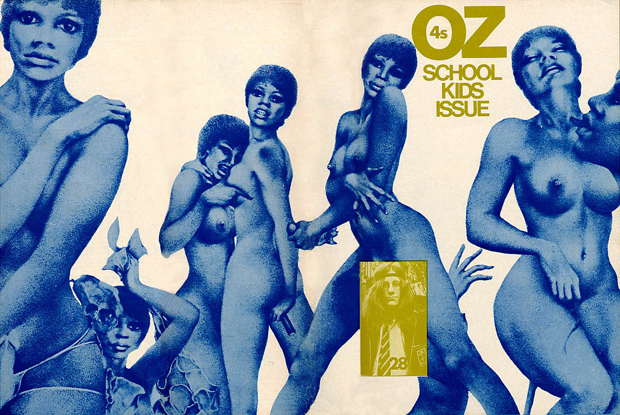
The school kids issue of Oz magazine lead to one of the longest conspiracy trials in England (Image: OZ/Wikimedia Commons)
Felix Dennis, a publisher, poet and spoken word performer, passed away on Sunday at his home in Stratford-upon-Avon, aged 67. Dennis was perhaps most well-known for being the brainchild behind publications such as Blender, Men’s Fitness, and The Week. But it was his work with Oz magazine as co-editor in the 1970s, and the ensuing conspiracy trial over the infamous school kids issue of the publication which first threw Dennis’ name into the limelight.
In 2008, John Mortimer spoke to Index about defending the editors of Oz magazine as he took on one of the most infamous obscenity cases on the 1970s:
Oz was a satirical, underground magazine founded in Australia in the 1960s. The editors of the London edition – Richard Neville, Jim Anderson and Felix Dennis – were prosecuted under the Obscene Publications Act in 1971 for a schoolkids issue (edited by teenage schoolchildren). Particular offence was caused by a cartoon of Rupert Bear having sex – in a collage created by schoolboy contributor Vivien Berger. The editors were found guilty and the convictions provoked an outcry. Hundreds demonstrated outside the Old Bailey in London, including John Lennon and Yoko Ono. The verdict was later quashed on appeal.
Index: What were the grounds for prosecution?
John Mortimer: Well, it was sort of the birth of that particular Obscene Publications Act [1959], which was Roy Jenkins’s doing [Jenkins was principal sponsor of the bill as a backbench MP]. It was meant to be liberalising, because it allowed defences of literary merit and scientific merit and all sorts of ‘bits’ of merit. It was a test of that and the Obscene Publications Act, which was meant to be a work of great liberality. It would test obscenity, which was something that would tend to deprave and corrupt the people who were likely to read it. But then there were numerous defences – that it was of literary merit or historical merit or scientific merit and so on. It seemed rather strange you could be depraved and corrupted, and on the other hand you knew more about history – that could be a defence. So it never ever seemed to me to be a particularly sensible piece of legislation.
Index: What did you think of it first of all, when you discovered what the charges were?
John Mortimer: It was the schoolkids Oz and nobody wanted to do it. Everybody turned it down. They thought it was disgraceful, defending the schoolkids Oz like that. Numerous QCs turned it down.
Read the full article here.
24 Jun 2014 | Egypt, Middle East and North Africa, News
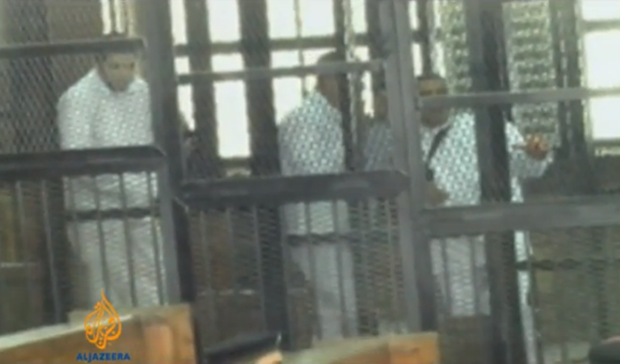
(Image: Al Jazeera English/YouTube)
In a heavy blow to press freedom in Egypt, three Al Jazeera English (AJE) journalists were convicted Monday on charges of spreading false news, aiding a terrorist organisation and endangering national security.
Australian award-winning journalist Peter Greste and Canadian-Egyptian national Mohamed Fahmy, AJE Cairo Bureau Chief, were handed down seven-year jail sentences each. A third AJE journalist, Baher Mohamed, was meanwhile, sentenced to ten years — three more than his colleagues, on an additional charge of possessing an empty bullet case. The three journalists have been in detention since December and have steadfastly denied the charges against them.
Ten defendants in the same case — including three foreign journalists — were sentenced to 10 years in absentia, while three others — including Anas El Beltagui, son of jailed Muslim Brotherhood leader Mohamed El Beltagui — were acquitted.
The rulings shocked and outraged journalists and rights activists around the world, fuelling concern about freedom of expression and the independence of the judiciary in Egypt, three years after the country witnessed a mass uprising that toppled the authoritarian regime of Hosni Mubarak, raising hopes of greater freedoms.The unexpectedly harsh verdicts also sent a chilling message to journalists working in Egypt that the government was adamant on pursuing its zero-tolerance approach to dissent and that journalists are not immune from the authorities’ policy of silencing critics at any cost.
Sherine Tadros, an Egyptian journalist and former AJE reporter denounced the verdict in a Twitter post shortly after it was pronounced, saying: “As a friend of the jailed journalists, I feel incredibly sad; as a journalist, I am scared and as an Egyptian, I’m ashamed.”
“The ruling sends a clear message to journalists to adhere to the official narrative or risk severe punishment,” an Egyptian broadcaster who spoke on condition of anonymity, told Index after the verdict.
Meanwhile, in an interview on Al Jazeera shortly after Monday’s court session, Amnesty International director Steve Crawshaw deplored what he called an “outrageous ruling”, adding that the verdict was another step in Egypt’s “campaign of terrorizing people and terrorizing the media”.
Since Islamist President Mohamed Morsi was deposed on 3 July, dozens of journalists have been detained in Egypt as part of a massive government crackdown on dissenters of all stripes: Muslim Brotherhood leaders and supporters, secular activists and journalists.The release this week of two journalists — including Abdulla El Shamy, a reporter for the Al Jazeera Arabic Channel who had been held in detention since mid August — had raised hopes that at least 14 other journalists still in detention, would also be acquitted. The judge’s decision to prolong the detention of the AJE journalists however, has raised questions about the new government’s commitment to democratic principles.
“Today’s verdict is deeply disappointing. The Egyptian people have over the past three years, expressed their wish for Egypt to be a democracy. Without freedom of the press there is no foundation for democracy,” Britain’s ambassador to Egypt, James Watt, told Reuters after the verdict.
In the past eleven months, journalists covering “anti-coup” protests staged by Muslim Brotherhood supporters have allegedly been deliberately targeted by security forces and pro-government mobs who accuse them of being “paid agents” and “spies”. Since the Islamist president’s ouster last July, five journalists have been shot dead and several others wounded by riot police while reporting on the clashes between protesters and security forces, prompting an outcry from rights groups. In a statement released in April, the Cairo-based Arab Network for Human Rights Information denounced the increased attacks on journalists and called on the Press Syndicate and media outlets to ensure their protection. The New York-based Committee for the Protection of Journalists which ranked Egypt among the three “most deadly” countries for journalists in a 2013 report, also called on the Egyptian government to investigate the assaults on journalists and hold the perpetrators of such crimes to account. The calls came in response to the death of Mayada Ashraf, a 22 year old reporter who worked for the privately-owned Al Dostour newspaper. She became Egypt’s latest journalist-fatality when she was shot in the head on 28 March while covering the dispersal of a Muslim Brotherhood protest in Cairo.
Several Egyptian journalists have in recent months, complained of intimidation. They said they had received threats from security agents or were subjected to smear campaigns aimed at tarnishing their reputation. In today’s repressive, deeply polarised climate in Egypt, many local journalists have decided to “play it safe” adopting the state narrative and persistently vilifying the Muslim Brotherhood while lionising the military and the new president.
Not surprisingly, there has been little sympathy for the jailed AJE journalists in the Egyptian press. Out of fear of being labelled “unpatriotic” by the public or suffering an even worse fate, most local journalists have either remained silent on the AJE case or taken a stand against the defendants, referring to them as part of a “Marriott Cell” and implying they were “traitors” who had been working to sabotage the country. Some of the guests interviewed by talk show hosts on state-influenced media channels recently, have echoed the prosecution’s argument that “channels like Al Jazeera brought down Iraq and were planning to do the same in Egypt”. In the wake of Monday’s court rulings, it is highly likely that the current trend of journalists practicing self-censorship will continue.
After Monday’s verdict, Egyptian State Television reported that Foreign Minister Sameh Shoukry had forcefully rejected pressure from foreign governments to overturn the court decision. On a visit to Cairo the day before, US Secretary of State John Kerry had reportedly raised the issue of media freedom in talks with the country’s new President Abdel Fattah El Sisi. Kerry who had expressed concern about the jailing of journalists in Egypt, reacted to the verdict Monday by calling it “chilling and draconian”.
Meanwhile, rights activists also expressed alarm at the outcome of Monday’s court proceedings, calling the trial “political”.
“The charges against the journalists are politicised,” said Mohamed Lotfy, a rights activist who has worked as a researcher with Amnesty International. “The AJE journalists are pawns, caught in the middle of a political dispute between Qatar and Egypt.”
The Egyptian authorities are angry over Qatar’s continued support for the Muslim Brotherhood, delcared by Egypt a “terrorist organisation” last December. The Egyptian government has also accused the Qatari-funded Al Jazeera network of bias in favour of the outlawed group — an accusation that has been repeatedly denied by the network.
While most activists are “appalled” by Monday’s verdicts and have laid the blame on what they call a “highly politicised judiciary”, Sahar Aziz, an Associate Professor of Law, Texas A&M University, told Index she believes judges in Egypt are themselves “victims” of the country’s turbulent political transition.
“There is evidence that some judges are under indirect pressure from the executive branch to adjudicate these political cases in ways that legitimise the official narrative that the state is facing a threat to its national security,” she said, adding that “Over the past year, a group of judges reputed to be independent have been expelled from the judiciary through ‘voluntary retirement’ or in other settlements with the governing judiciary apparatus. This has sent a chilling message to other judges that the cost of truly independent adjudication is prohibitively high.”
But the government’s piling pressure on the judges meant little to family members of the jailed journalists who were stunned by the ruling.
“It is shocking. We were totally unprepared for this,” said Andrew Greste, Peter’s brother who had expected Peter to fly back to Australia with him where his elderly parents were eagerly awaiting their son’s return. “Obviously, it will take some time to rethink our plans and decide what we can do next,” he told journalists outside the courtroom.
Mohamed Fahmy’s fiancee Marwa, who attended the court session, broke down crying on hearing the verdict. The couple had been planning their wedding in April.
Wafaa Bassiouny, Fahmy’s mother, shouted out as she walked out of the courtroom, “What has my son done to deserve this? He was just doing his job. He is now unable to move his right arm, isn’t that enough?”
Fahmy has been denied adequate medical treatment by prison authorities for a shoulder injury sustained before his arrest and has now lost full use of his right arm
But all hope is not lost. It is still highly likely that through an appeals process, the sentence may be reduced, or the journalists may even be acquitted at a later date. Only by recognising justice and reversing its current course, can the new government in Egypt gain credibility in the eyes of the international community and win the backing and solidarity it badly needs.
This article was posted on 24 June, 2014 at indexoncensorship.org
24 Jun 2014 | News, Politics and Society
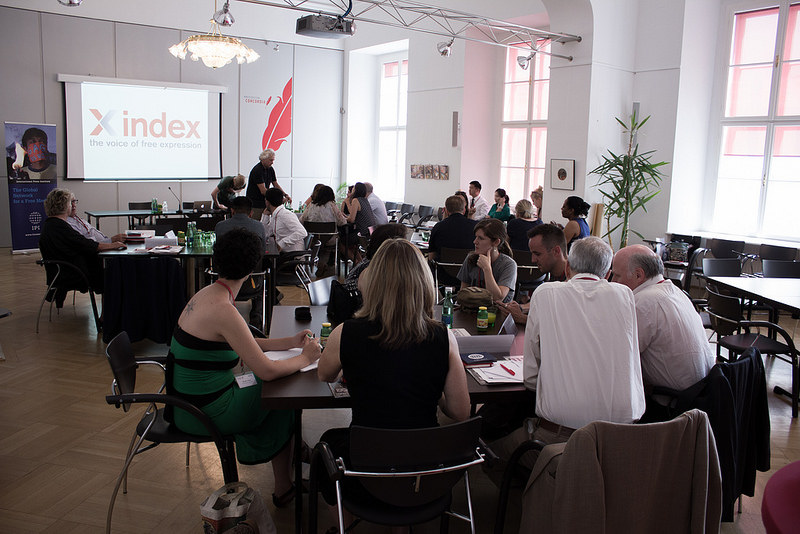
Index speaks at the IAPC meet 2014, Vienna
There has been an 18% rise in violence towards journalists compared to the same period last year, International Media Support, an organisation that works in many of the world’s biggest danger zones, told an international journalism conference.
News from Egypt – as three journalists from Al-Jazeera are sentenced to seven years in prison – demonstrates the huge threats that journalists can face. The subject was covered in detail at this year’s International Association of Press Clubs annual conference in Vienna, which Index on Censorship attended this month.
“Some countries we just can’t work in,” said John Barker from Media Legal Defence Initiative, who help represent journalists facing legal charges for reporting and presented on their work. “Every time we work in Vietnam, for example, the lawyers are arrested. In many places, we can’t transfer money to them.” Nonetheless, they are currently working on 102 cases in 39 countries.
Other topics for discussion included:
- The increasing number of freelancers working in danger zones – and with little training
- How to protect fixers, translators and local journalists
- Possible methods for funding legal representation (Crowdfunding worked as a recent experiment in Ethiopia, said MLDI)
The event was hosted by Austria’s PresseClub Concordia – said to be the oldest press club in the world (founded in 1859 – reformed in 1946, after having its assets seized by Nazis). It was attended by press clubs from around the world, including Poland, Belarus, Syria, the Czech Republic, the US, India, Ukraine, Mongolia, Germany, and Switzerland. Other NGOs – alongside Index, International Media Support and Media Legal Defence Initiative – included the International Press Institute and RISC (Reporters Instructed in Saving Colleagues).
Index was invited to present on the work the organisation is doing around the world, which included sharing the stories of our Freedom of Expression Awards winners and nominees, and news of our current work, including a crowdsourcing project to map media freedom violations across the EU. Plus we also shared stories from our quarterly magazine – including a report on violent threats to journalists in Tanzania and how news stories are getting out of Syria via citizen reports.
Index also hosted round-table discussion on censorship, which provoked an impassioned debate. One of the most interesting topics covered was on contracts that some journalists are being made to sign on what they can and can’t write. We heard of cases in Mongolia and Germany. We also discussed self-censorship and censorship by complying to advertisers’ will. One attendee from the Berlin Press Club said: “There is no censorship in Germany, but journalists feel like they have scissors in their heads. You have to self-censor before you write.” This is an area that we are researching, so please get in touch if you have experiences and examples.
The meeting also visited a new exhibition on censorship during WW1 and ended with the Concordia Press Club’s annual ball, which is a key fundraiser for the club and attended by over 2,000 guests. See photos from the event below.
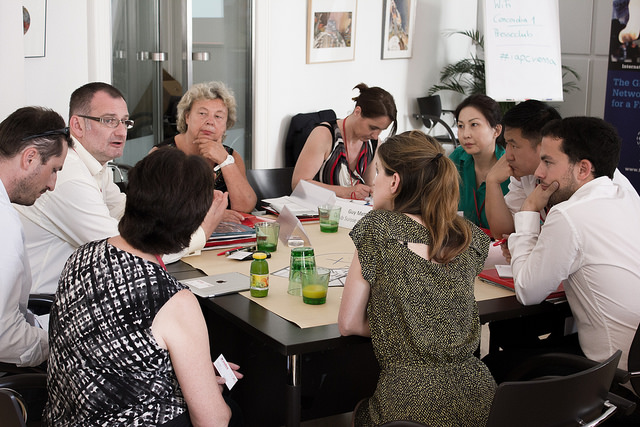
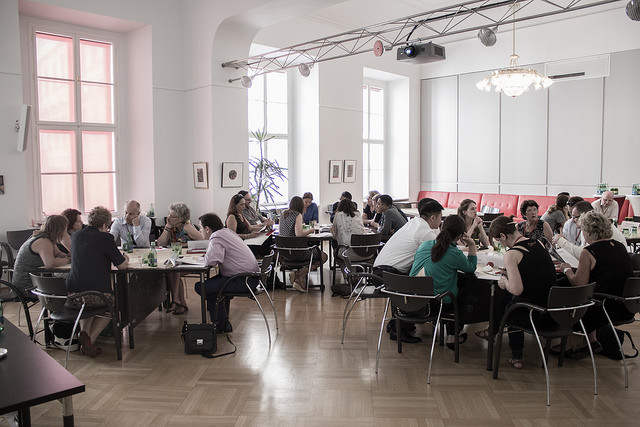
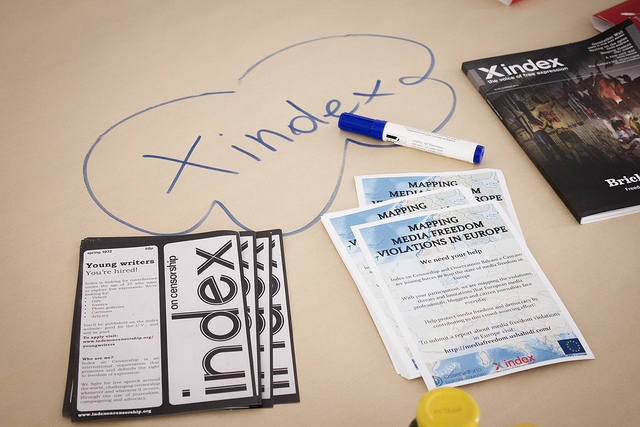
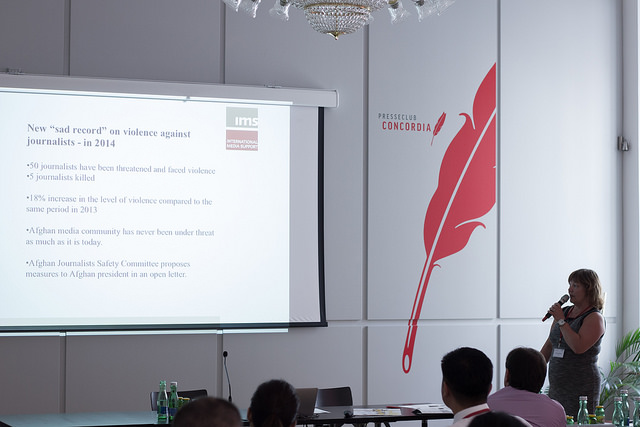
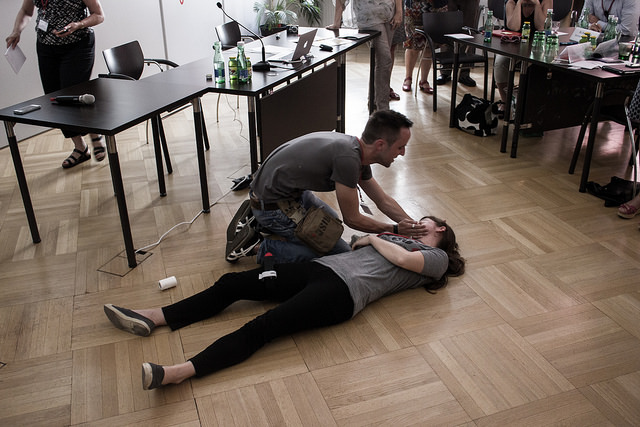
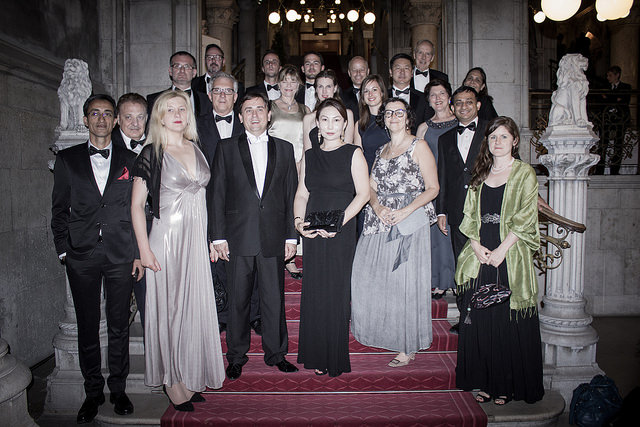
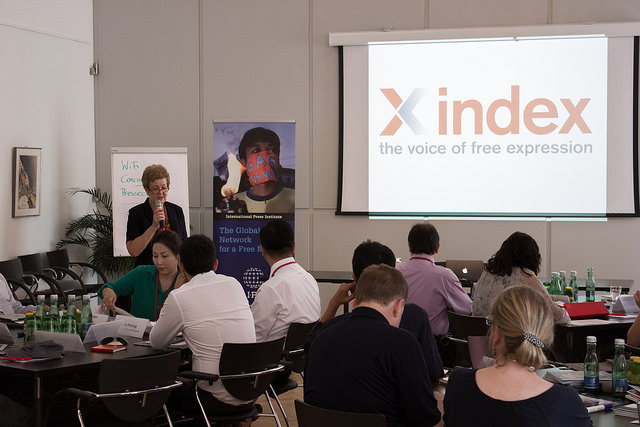
This article was posted on June 24, 2014 at indexoncensorship.org










